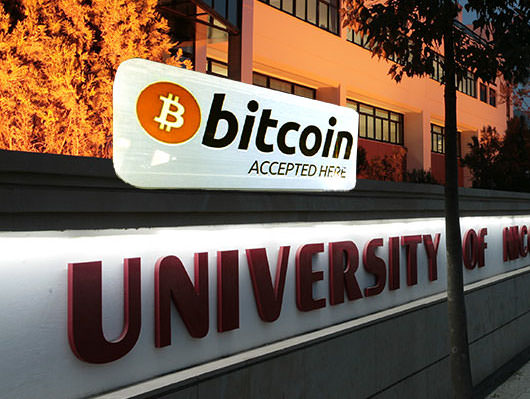
University of Nicosia in Cyprus Becomes First in the World to Accept Bitcoin

Cyprus university bitcoin
The University of Nicosia in Cyprus has announced that it will accept bitcoin for the payment of tuition and other fees.
The university, also known as UNic, is not only the first accredited university in the world to accept bitcoin from its students, but is also launching a Master of Science degree in Digital Currency in Spring 2014.
UNic's Chief Financial Officer Dr. Christos Vlachos believes in the virtues of bitcoin, stating:
Vlachos also believes that digital currency will "create more efficient services and serve as a mechanism for spreading financial services to under-banked regions of the world."
UNic's initial impetus for accepting bitcoin came from receiving requests from online students in such under-banked countries, with Vlachos noting Kenya as a prime example.
After looking into it some more, the administration decided that bitcoin was faster, cheaper, easier and more convenient, and decided to offer it as an option for its students.
Garrick Hileman, economic historian at the London School of Economics, suggested that UNic's move is a sign of growth in bitcoin's credibility as a medium of exchange at more traditional institutions.
[post-quote]
He added: "The most fertile ground for bitcoin is in places like Cyprus, Argentina, Iceland, China and other countries which have experienced significant financial disruptions and/or maintain strict financial controls."
When questioned about its decision in light of bitcoin's recent volatility, a university spokesperson told GeekWire: “The intention of this initiative is to ease transmission difficulties for certain students and to build our own practical knowledge about this field, not to engage in currency speculation.”
Founded in 1980, the University of Nicosia is the largest private university in Cyprus, with campuses across three of its cities and over 8,500 students in total across its affiliated institutions. It is also one of the largest universities in the Mediterranean region of Europe.
UNic also plans to lobby the Cypriot Government for a framework to develop Cyprus into a hub for bitcoin exchange, trading and banking.
The bitcoin price saw a massive surge to $266 in April during the financial crisis in Cyprus.
Paul Smocer, president of BITS, which promotes discussion of technology issues for the financial services industry, mentioned discussed the influx of interest in digital currencies that resulted from the crisis this at a recent US Senate hearing on bitcoin.
In the past few weeks, the bitcoin price has soared to even greater highs, and remains high despite some recent fluctuations.
UNic may be the first accredited university to accept bitcoin, but other educational services have already embraced the digital currency.
Earlier in the year Khan Academy launched a series of educational bitcoin videos and announced it is accepting donations in bitcoin. Draper 'entrepreneur heroes' University, a VC-founded school for entrepreneurs based in Silicon Valley, also has a tuition programme that accepts bitcoin.
Featured image: hxdbzxy / Shutterstock
DISCLOSURE
The leader in news and information on cryptocurrency, digital assets and the future of money, CoinDesk is a media outlet that strives for the highest journalistic standards and abides by a strict set of editorial policies. CoinDesk is an independent operating subsidiary of Digital Currency Group, which invests in cryptocurrencies and blockchain startups. As part of their compensation, certain CoinDesk employees, including editorial employees, may receive exposure to DCG equity in the form of stock appreciation rights, which vest over a multi-year period. CoinDesk journalists are not allowed to purchase stock outright in DCG.

